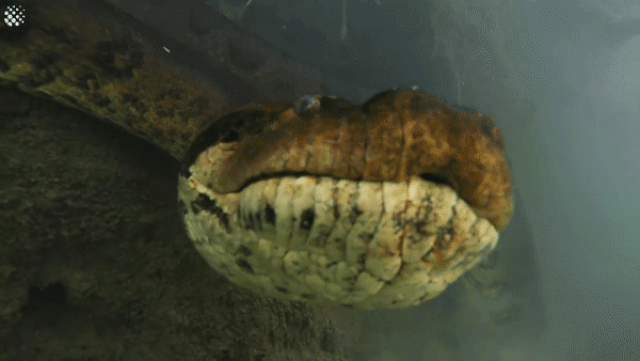Heart-pounding when confronting a 'legless monster' in the river bed
A group of tourists in Brazil suddenly encountered a giant anaconda about 7 meters long while exploring the Formoso River bed.
The scenes taken in late July were recorded by Bartolomeo Bove and friend Juca Ygarape. While they were diving in the Formoso River with a camera in hand, a giant python slipped through the lens. Thanks to that they have the most authentic footage.

Anaconda python curiosity in front of the lens but then calmly swim away.
Anaconda pythons do not intend to attack. It only searched for a moment in front of the camera and crawled away.'It was completely indifferent to our presence. Sometimes it comes closer out of curiosity and licks the lens, but then leaves , ' says Bove.
According to Bove, the rivers that flow around the town of Bonito are the only places in South America that can find python anaconda under clear water. Therefore, divers can swim with them.
Anaconda, also known as the South American python , is a giant serpent that lives in the Amazon basin or the swampy, dense forests of South America. They include blue, yellow, black-and-white spots and giant Bolivia pythons.
Local people claim they have seen giant pythons up to 15 meters long but no one has ever caught one of the same size.
Most of the time, the anaconda swims along the rivers and marshes in search of food. They live solitary and have very good camouflage in the lagoon so rarely found in the wild.
The python hides itself in the water, hunting by wrapping itself tightly and squeezing, causing the victim to die of suffocation and organ rupture. After the prey dies, the python will swallow the victim slowly.
With its ability, anaconda easily kills a healthy adult. Therefore, this animal is also known as the 'legless monster' of the Amazon forest.
- Giant anaconda python eating crocodile meat on the Brazilian river
- Does Anaconda really eat people like in movies?
- Legend of the 'water monster' Da river
- Catch the super monster, must use 4 people
- Giant monster in the Amazon River before extinction
- Vam Nao and the interesting anecdote about the 5-legged crocodile
- Giant monster fights are about to perish on the Me Kong line
- Confluent rivers are not suitable for color matching
- 10 most famous aquatic monsters of all time
- Catch the reptile monster monster fish, mysterious fossil scales
- 'Foolishness' hunting fish in the Ham Luong River: Seeing the corpse coming to the face 'death'
- Stone stele depicts the battle of blood between the son of Hercules and the monster
- Doubt in the legless leg of the Renaissance warrior
- Surely the giant sea monster swam under the water, marveling at the truth
 Animal 'suffering' after hibernation
Animal 'suffering' after hibernation Why do goats climb well?
Why do goats climb well? Scientists were surprised to see chimpanzees eating turtles
Scientists were surprised to see chimpanzees eating turtles Giant catfish died deadly due to drought in Thailand
Giant catfish died deadly due to drought in Thailand